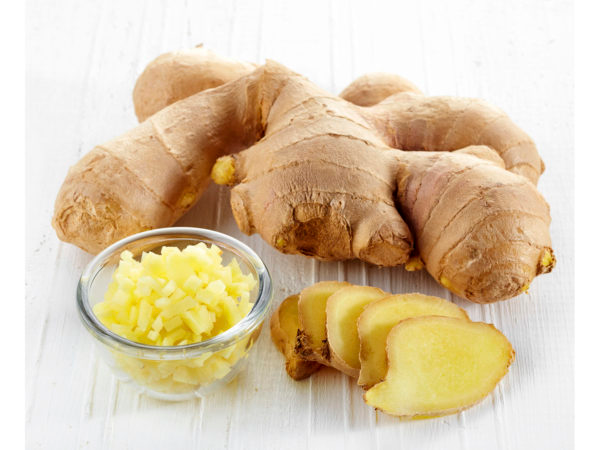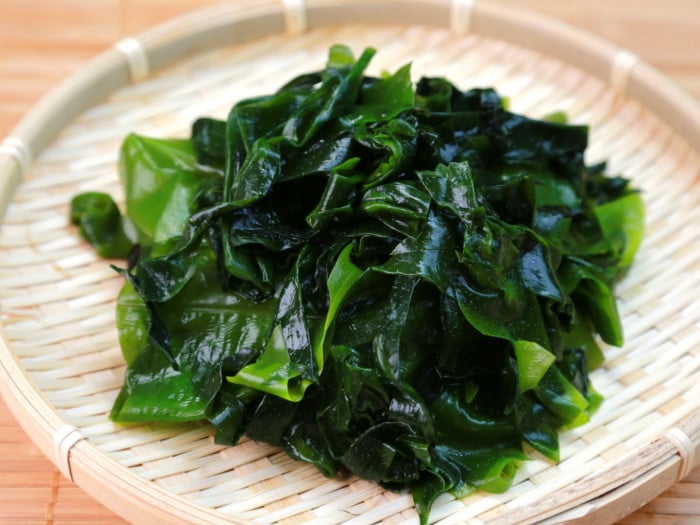Health
How to use ginger for migraines and headaches

Discover how to use ginger for migraines and headaches.
Derived from the rhizome of the Zingiber officinale species native to India, dried ginger is used as a spice in cooking, but also in traditional medicine as a natural remedy, in particular, to relieve headaches and migraine.
Let’s find out together why and how to use ginger for migraines and headaches.
Migraine and its causes
Migraine is a pathology manifested by headaches, sometimes violent, occurring regularly and repetitively, usually on one side of the head, sometimes associated with vomiting.
Seizures last 4 to 72 hours, and appear more or less frequently, ranging from several times a week, to just a few times a year.
There are many causes of migraine, and many factors can influence this disease:
• Digestive disorders
• Hormonal disturbances
• Eye problems
• Sinusitis
• Arterial hypertension
• Dental infections
• Anemia
• Cervical blockages
• Kidney problems
• Lifestyle: quality of diet, stress, fatigue, tobacco, alcohol, lack of physical activity, etc.
• etc.
It is, therefore, necessary to resolve the cause of migraine before trying to relieve it.
Ginger: a natural remedy to relieve migraine
There are many natural solutions to relieve and pass a migraine, among them: ginger.
The action of ginger on nausea, motion sickness, and dizziness is no longer to be proven, as are it is anti-inflammatory and vasodilator effects. Its cumulative properties make ginger an effective ingredient in relieving migraine pain.
Even if the use of ginger against migraines is very old, there is to date only one comparative study in powder of the rhizome and Sumatriptan, a drug prescribed worldwide against migraines, which exists under different trade names. : Imitrex, Treximet, Imigran, etc.
This 2014 randomized study was conducted in Iran on 100 migraine patients, double-blind controlled for one month, aimed at comparing the effectiveness of taking ginger with that of sumatriptan in the treatment of migraine attacks.
One group took conventional sumatriptan 50 mg treatment, and the other group took a ginger powder in 250 mg capsules or 1/8 teaspoon of ground ginger. The treatment should be taken as soon as the pain appears.
Results: 2 hours after taking the treatment, 70% of the patients who took sumatriptan reported a significant reduction in symptoms, compared to 64% of the group who took ginger.
The efficacy reported by the patients is similar with a drop of more than 4.5 units on the VAS scale for the 2 groups. After 1 month of treatment, each of the patients states that they wish to continue with the treatment given to them.
The main difference between the two treatments is the side effects: indeed, taking sumatriptan has shown the appearance of side effects, mainly dizziness, a sedative effect, and heartburn, while taking ginger showed no adverse effects.
The researchers conclude that ginger is an additional natural option to consider in the fight against migraines, which may be offered to patients with contraindications to treatment with triptans.
How to use ginger for migraines
The study cited above was done with powdered ginger, but it is possible to consume dried or fresh root ginger.
You can consume it several times a day, directly in a glass of water, or make ginger tea. It is possible to mix the ginger powder with a little honey to facilitate its setting.
In case of migraine, take 250 mg of powdered ginger anyway to relieve the attack, and be sure to see a doctor.
Side effects of ginger for migraines and headache
As we have seen, there is no adverse effect to the consumption of ginger if the doses are respected, but it is advisable to take precautions in case of consumption of ginger, it is up to you to consult them to consume it. safely.
To sum up, you should be careful in the following cases: coagulation problems, before surgery, gallstones, thinness, ulcers, in case of anticoagulant treatments, against diabetes, hypertension, and heart problems
Health
8 shocking health benefits of Tamari

Table of Contents
Health
10 benefits of wakame seaweed and side effects

Table of Contents
-
- 1.- Benefits of wakame seaweed for diabetes
- 2.- Benefits of wakame seaweed for weight loss
- 3.- Helps balance hormones
- 4.- Benefits of wakame seaweed for Bones
- 5.- Benefits of wakame seaweed for breast cancer
- 6.- Benefits of wakame seaweed during pregnancy
- 7.- Reduce high blood pressure
- 8.- Reduces cholesterol naturally
- 9.- Good source of iron
- 10.- Rich in Omega-3 fatty acids
- How to use and cook Wakame seaweed
- Side effects of wakame seaweed
- Discover the 10 shocking health benefits of wakame seaweed and side effects.Seaweed has long been a staple of Japan, which is one of the longest living cultures in the world. Is there a connection? In particular, the benefits of wakame seaweed are rich in various vitamins and minerals.
They provide a great nutritional boost while supporting the cardiovascular system, maintaining hormonal balance, strengthening bones, improving circulation, and promoting healthy skin.
Some research suggests that the benefits of wakame seaweed may reduce breast cancer incidence and mortality among postmenopausal women; It’s no wonder that Japanese marine farmers have been farming wakame for hundreds of years.
Additionally, like many sea vegetables, wakame seaweed adds a delicious component to a variety of foods but has recently gained popularity due to its many health benefits.
-
1.- Benefits of wakame seaweed for diabetes
An important component in the benefits of wakame seaweed is fucoxanthin, it has an antidiabetic effect.
The anti-obesity and anti-diabetic effects of fucoxanthin-rich wakame seaweed lipids were tested in a group of obese mice, this study showed that these algae can significantly suppress body weight.
Before wakame treatment, the mice showed signs of hyperglycemia, hyperinsulinemia, and hyperleptinemia, but the addition of wakame algae to the diet normalized these conditions.
The researchers concluded that wakame seaweed can prevent diabetes, related disorders, and obesity by reversing the insulin resistance that is due to a high-fat diet.
2.- Benefits of wakame seaweed for weight loss
The fucoxanthin present in wakame seaweed benefits promotes fat burning within the fat cells of animals.
Fucoxanthin is believed to fight fat in two ways: it encourages the action of a protein that causes fat oxidation, and it is found in the type of fat that surrounds the organs.
It also promotes the production of DHA in the liver, which helps lower bad or LDL cholesterol.
Fucoxanthin also reduces the weight of abdominal white adipose tissue in rats and mice, making it one of the best fat-burning foods.
3.- Helps balance hormones
The benefits of Wakame seaweed provide in addition to manganese, a little iron, and calcium, three of the minerals that help balance hormones naturally.
Manganese and calcium help improve PMS symptoms; Because manganese helps with hormonal regulation and shows antioxidant activity, wakame seaweed can also work as a natural treatment for infertility.
4.- Benefits of wakame seaweed for Bones
One hundred grams of wakame seaweed provides 15 percent of your daily value for calcium, which is essential for preventing osteopenia or osteoporosis.
Foods rich in calcium help increase bone growth and accelerate bone repair, while calcium deficiency occurs easily because we lose the mineral through the intestines, kidneys, and skin.
Osteoporosis is a common feature of aging; It involves bone loss that begins in women at the time of menopause and men at 55 years of age.
It can lead to increased rates of fractures, which is why getting enough calcium in your diet is so important.
5.- Benefits of wakame seaweed for breast cancer
There is a small body of research that suggests there is a relationship between seaweed and a lower risk of breast cancer.
In traditional Chinese medicine and Japanese folk medicine, seaweed is used to treat tumors. People who eat seaweed regularly, especially in Japan, have dramatically lower rates of breast cancer.
In 2013 the impact of the introduction of the benefits of wakame seaweed in the diet of postmenopausal women was evaluated.
15 healthy postmenopausal women were recruited for the three-month clinical trial.
Five of the women had no history of breast cancer (they served as a control group) and 10 were breast cancer survivors.
Consumption of seaweed reduced concentrations of the urokinase-type plasminogen activator receptor, a protein that is present in several physiological sites and is generally higher among postmenopausal women.
The concentration of uPAR is known to influence cell surface signaling, adhesion to calls, and growth factor communication and response in breast tissue.
Researchers believe that the ability of wakame seaweed to decrease these receptors may help explain the lower incidence of breast cancer and mortality among postmenopausal women in Japan.
There’s no question about it, science is backing up these amazing benefits of wakame seaweed, and more studies are underway to evaluate its effectiveness as a cancer treatment or preventive measure.
6.- Benefits of wakame seaweed during pregnancy
Folate or B12 is an essential vitamin present within the benefits of wakame seaweed; it is necessary to copy and synthesize DNA, produce new cells, and support nerve and immune function.
Folate is known to be one of the most critical vitamins or a vibrant healthy pregnancy.
For pregnant women, folate deficiency is especially risky because it can lead to neural tube defects such as spina bifida, anencephaly, limb malformations, and heart complications.
Because folate is needed to copy DNA and build new cells, it is vital that pregnant women consume enough folate foods, such as wakame seaweed, to decrease the risk of developmental problems.
7.- Reduce high blood pressure
Several studies have investigated whether the benefits of wakame seaweed can naturally prevent high blood pressure.
One study found that treatment with wakame seaweed significantly lowered systolic blood pressure in spontaneously hypertensive rats.
Another study in Japan admitted that the wakame diet may have beneficial effects on hypertension.
A study was carried out in 2011 and examined whether seaweed could affect blood pressure in children.
Healthy Japanese preschoolers, ages 3 to 6, measured blood pressure and pulse before and after a three-day period that involved consuming seaweed.
Blood pressure measurements, complete diet records, and parent-reported height and weight were obtained for 223 boys and 194 girls.
The researchers found that girls with the highest seaweed consumption had significantly lower systolic blood pressure readings.
The results suggest that seaweed ingestion was negatively related to diastolic blood pressure in boys and systolic blood pressure in girls, demonstrating that seaweed could have beneficial effects on blood pressure among boys.
8.- Reduces cholesterol naturally
The fucoxanthin present in most of the wakame seaweed benefits serves another function: it stimulates the liver to produce DHA, which helps reduce the amount of harmful cholesterol in the body.
Therefore, it is an excellent food for lowering cholesterol.
One study found that dry wakame seaweed powder altered the activities of enzymes involved in fatty acid metabolism in the liver in rats.
Rats that were fed diets containing powdered wakame had lower levels of triacylglycerol, suggesting that wakame seaweed is useful as food to prevent hyperlipidemia.
Hyperlipidemia means that there are too many lipids or fats in the blood, this leads to high levels of cholesterol and triglycerides, which can lead to the development of dangerous pests and blockages.
9.- Good source of iron
The iron in wakame kelp benefits increases red blood cell production and helps with the metabolic enzyme processes the body carries out to digest protein and absorb nutrients from food.
An iron deficiency is the most common nutritional deficiency in the world and is associated with developmental delay, altered behavior, decreased intellectual performance, and decreased resistance to infection.
Excessive iron supplements can cause iron overload and should be avoided, so the safest and surest way to get enough iron per day is to stick to iron-rich foods like wakame.
10.- Rich in Omega-3 fatty acids
Wakame seaweed is a rich source of omega-3 fatty acids, which is an essential fatty acid because it is not made by the human body, but it is still necessary for normal metabolism.
Omega-3 foods can be used to lower cholesterol, fight depression, reduce anxiety, reverse diabetes, reduce inflammation, relieve arthritis, and promote skin health.
They have also been shown to support weight loss, healthy pregnancy, sports recovery, and thickening of hair and nails.
Due to the excessive consumption of omega-6 fats in the Western world, we must stick to the omega-3 foods that our bodies need.
How to use and cook Wakame seaweed
You can find dry or fresh wakame seaweed; It can be stored in a refrigerator, where it is preserved with sea salt, or it can be found in a sealed package where it is dehydrated and brittle, similar to nori (the seaweed used for rolling sushi).
If you have dehydrated wakame seaweed, start by cutting it into small pieces as it will expand after rehydration.
To rehydrate wakame, soak in water for approximately 30 minutes or until smooth; It can then be added to soups, French fries, and salads. The water used to rehydrate wakame is also packed with nutrients, so it can be used as a base for the soup.
Side effects of wakame seaweed
Although wakame seaweed is a nutritious food that offers a handful of health benefits, it does contain a good amount of sodium, 872 milligrams per 1 ounce of wakame.
People with high blood pressure may want to watch their wakame intake to make sure they are not consuming too much sodium in a day, as sodium works against potassium to lower blood pressure levels.
Benefits Of Wakame Seaweed For Diabetes
However, if you don’t want to eat Wakame seaweed directly, add them to different foods. For instance, you can make rice balls with wakame seaweed or just use it to give flavour to sushi. Talking about sushi, if you are interested in eating delicious sushi, sushiro delivery can deliver fresh sushi to your doorstep.
Health
Health benefits of pumpkin flower for eyesight

Table of Contents
- Pumpkin flower properties
- All your general health benefits of pumpkin flower
- How can pumpkin blossoms protect our eyesight
- Some precautions
- Discover the Health benefits of pumpkin flower for eyesight.The pumpkin flower is a highly recommended food for the many benefits it brings due to its magnificent properties and for being an extraordinarily versatile food, since the pumpkin flowers can be prepared raw or cooked (in batter, for example) and also added to soups and salads.
Pumpkin flower properties
The main properties of this food are:
•The pumpkin flowers are an important source of vitamins A, C, B1, B2, B3 and B9.
•They are especially rich in calcium.
•They also provide various minerals: iron, calcium, phosphorus, potassium and magnesium.
•It is a food that contains hardly any saturated fat, sodium and fiber.
•It is also very low in cholesterol.
•Almost 90% of its content is water.
At the quantity level, for every 100 grams of the edible part of the pumpkin flower we find:
•95, 15 grams of water.
•Only 0.24 grams of fat.
•Calcium is counted between 39 and 47 grams.
•Smaller amounts of potassium, iron, and magnesium.
All your general health benefits of pumpkin flower
•The pumpkin flower helps to delay the symptoms of aging, since it prevents the oxidation of LDL (which is a low-density lopoprotein).
•It promotes the formation of white blood cells, which strengthens the immune system and, therefore, the effective response of the body against the attack of infectious agents.
•It favors the production of repair enzymes.
•Being rich in phosphorus and calcium, they are highly recommended for children and adolescents, since they are in full growth.
•In addition, pumpkin flowers increase the formation of repair and anticancer enzymes and may even help block the development of malignant cells.
How can pumpkin blossoms protect our eyesight
Like all foods rich in Vitamin A, pumpkin flowers help to delay and minimize the symptoms of aging in the body, and especially in the sense of sight. Hence, it can be said that this food helps prevent age-related visual pathologies:
•Cataracts .
•Diabetic retinopathy .
•Age-Related Macular Degeneration ( AMD ).
Some precautions
The pumpkin flower is a food that, as we have commented, can be eaten both raw and cooked and stands out for being very digestive. However, to consume it safely, it is advisable to take some precautions:
Buy them in specialized stores, to ensure that they are perfectly identified and that we know that their origin is totally safe.
They should be washed very well with fresh water before use.
Once they are perfectly washed, you have to drain them well, hanging them by the stem, being very careful not to spoil the petals.
It is not advisable to keep these flowers in the refrigerator for more than 24 hours, as they are very delicate. The ideal is to buy them in the right amount before consuming them.
Eating foods rich in Vitamin A , including pumpkin flowers, is one of the simplest and most natural ways to protect our eyesight. If we also lead a life where healthy habits prevail, such as exercising to the best of our ability and going to a specialist for regular check-ups and check-ups, we will greatly increase the chances of enjoying good visual health for a long time.
We hope the article on the Health benefits of pumpkin flower for eyesight has been of help.
-

 Food1 year ago
Food1 year ago10 + Benefits of carrot juice and side effects
-

 Benefits4 months ago
Benefits4 months agoThe Benefits of Joining Gym Lumolog – Improve Your Fitness & Health
-

 Health1 year ago
Health1 year ago50 Super Healthy (And Very Often Cheap) Foods
-

 Health1 year ago
Health1 year ago5 Shocking health benefits of kinkeliba and side effects
-

 Food1 year ago
Food1 year ago8 shocking benefits of leek juice and side effects
-

 Health1 year ago
Health1 year agoBenefits of guava leaves Sensually
-

 Weight Loss1 year ago
Weight Loss1 year agoChaz Bono weight loss secret
-

 Health1 year ago
Health1 year ago15 Benefits of lipton tea and side effects












